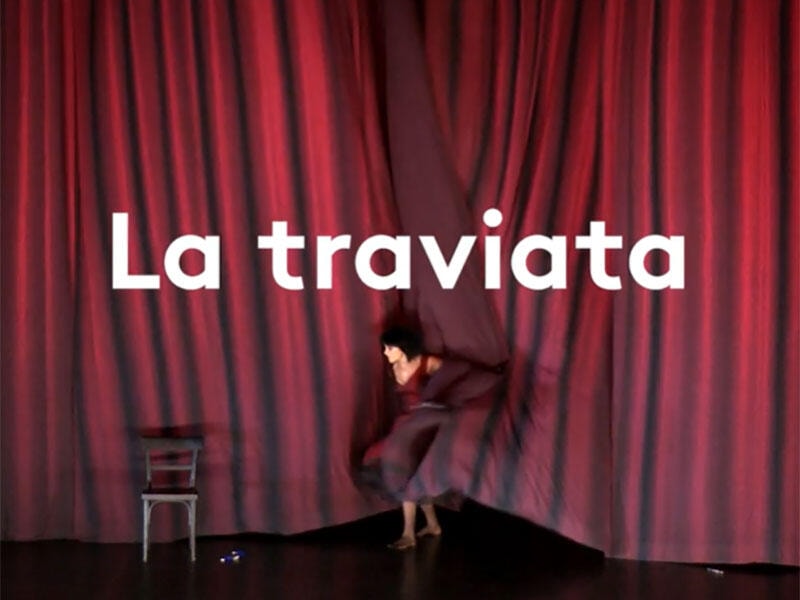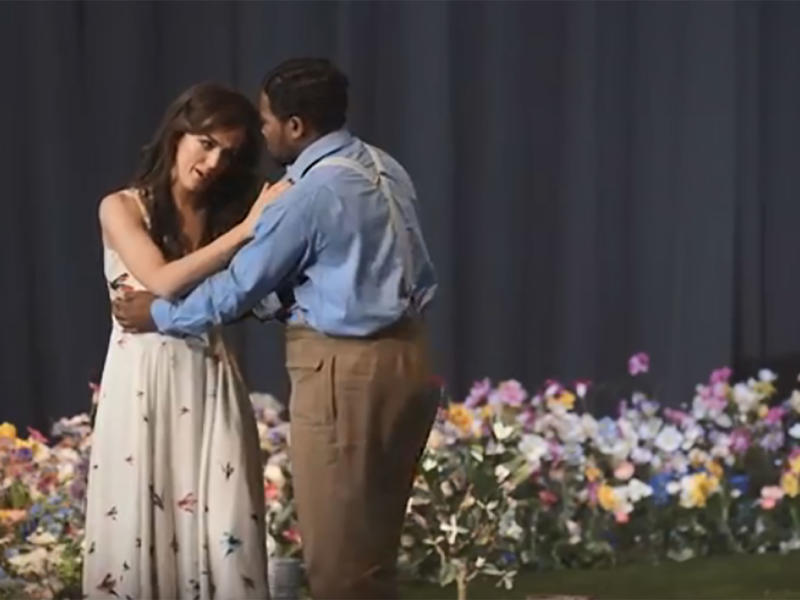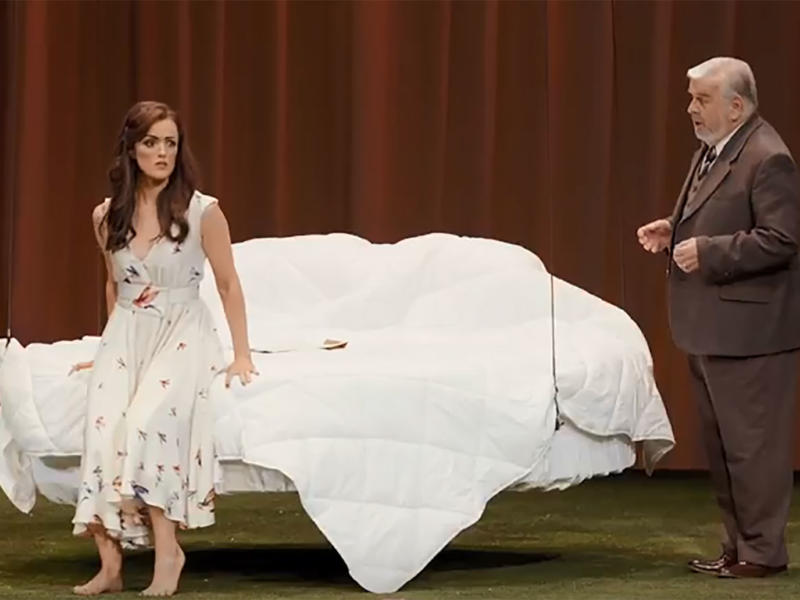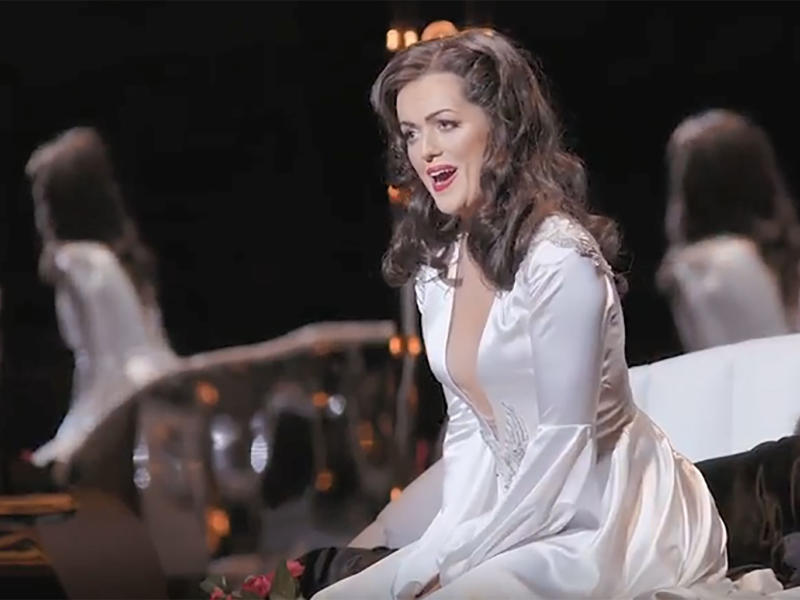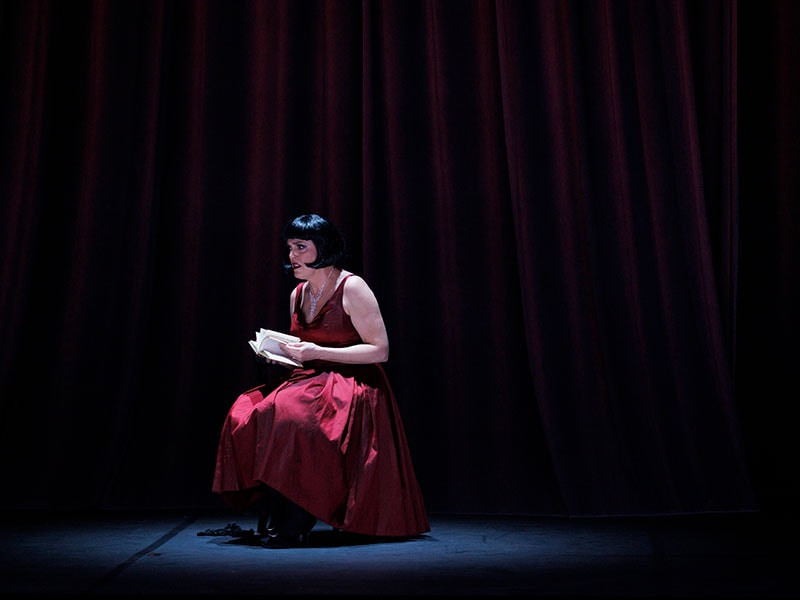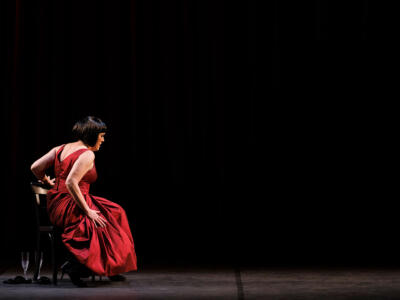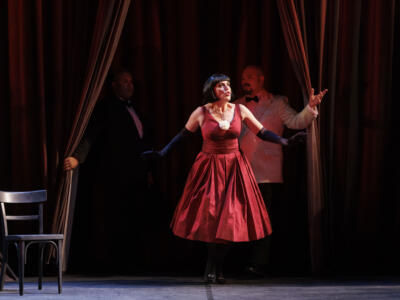Discover: La traviata
A tragic opera written by Italian composer, Giuseppe Verdi, La traviata follows the story of Violetta (a high-class courtesan in 19th-century Paris) and her passionate love affair with Alfredo (a young nobleman).
Despite their developing romance, the relationship is soon put under pressure as societal expectations, misunderstandings and illness threaten to tear them apart – ultimately leading to a heart-breaking conclusion.
Learn more about this iconic opera as we share a detailed story synopsis of La traviata, including the title’s meaning, famous songs and characters that play a key part in the plot. You can also read the answers to frequently asked audience questions, as well as watch video snapshots from previous ENO performances for a taste of the opera.
La traviata Synopsis
Act I: Paris
Violetta, a courtesan of renown desire, is hosting a lavish party with the upper-class gentlemen of Paris and her fellow courtesans, all funded by her admiring patron, Baron Douphol. Amidst the champagne, she is introduced to a middle-class gentleman, Alfredo Germont, who has been in love with her for over a year – since, we learn, her illness began. Alfredo is pressured to make a toast in which Violetta joins him, urging everyone to enjoy the fleeting pleasures of life. As the guests retire to other rooms, Violetta suddenly grows ill. While left alone with Violetta, Alfredo protests his love – which she discourages at first, but then accepts in a sudden reversal. As dawn breaks, the gentlemen must all go home, and Violetta is left alone to contemplate the idea of having a true love for herself. Instead, she resolves to plunge herself headlong into the vortex of hollow pleasures that make up her existence.
Act II
Scene 1: A house in the country, three months later
Violetta and Alfredo are now living together in the idyllic countryside. When Alfredo learns from her servant Annina that Violetta has sold her possessions to support the life they lead, he returns to the city to raise the necessary funds. In his absence, Violetta receives an unexpected visit from Alfredo’s father. He begs her to end their relationship, otherwise his daughter’s marriage into a respectable family will be threatened. After a relentless breakdown of her character, Violetta agrees to sacrifice her love – despite it breaking her will to live. Germont leaves and Violetta writes a farewell note to Alfredo: she will return to the city and Douphol’s patronage. Alfredo returns, and Violetta arranges for him to be given the note after she has gone. When he reads it, he refuses the consolation of his father (who has been watching from nearby), and rushes back to the city to avenge himself.
Scene 2: Paris, that same night
A party is in progress, enlivened by a masque of gypsies and bullfighters. Alfredo appears alone and witnesses Violetta on the arm of Douphol. The two men play an aggressive round of cards which Alfredo wins. When she has an opportunity, Violetta speaks to Alfredo alone and begs him to leave and avoid a deadly fight with Douphol; pressed by Alfredo, she maintains her promise to Alfredo’s father and tells Alfredo that she loves Douphol. In a fury, Alfredo summons the guests to witness the repayment of his debts as he flings his winnings at her. Germont enters in time to witness his son’s outburst and shames him. Alfredo must leave the party – and Violetta.
Act III: Violetta’s bedroom, a few months later
The doctor tells Annina that her mistress will soon die. Violetta instructs Annina to give what little money they have left to the poor, and re-reads a letter from Germont telling her that Alfredo now knows of her sacrifice and is returning to beg her forgiveness. She believes it is now too late for a reunion with Alfredo. She bids farewell to all her hopes and prays to be released from this suffering. The sounds of a carnival in the street summon false hopes of Alfredo’s return. Then, to her astonishment, Alfredo returns to hold his beloved. Germont arrives to give his blessing, full of remorse at the pain he has caused. But it is too late.
Frequently Asked Questions About La traviata
Who wrote La traviata?
Originally titled Violetta after the opera’s main character, La traviata was written by composer, Giuseppe Verdi (1813-1901), and set to an Italian libretto by Francesco Maria Piave. The story was based on Alexandre Dumas’s play, ‘La Dame aux Camélias’ (1852), which he adapted from his own novel of the same name (1848).
When was La traviata written?
La traviata was written in 1853 and premiered at the La Fenice opera house in Venice later that year. Although not initially popular with audiences, to this day it continues to be one of Verdi’s best-known works.
What is La traviata about?
La traviata is a tragic tale about Parisian courtesan, Violetta, who attempts to leave the life she knows behind to try and finally find true love. When she meets romantic, Alfredo, the hypocrisy of upper-class society threatens their love – and someone must pay the ultimate price.
Where is La traviata set?
La traviata is set in Paris, France in the late 1950s. The story plays out across various locations within the city, including Violetta’s luxurious Parisian home, Flora’s country house and the venues of elite social gatherings.
What is the famous aria from La traviata?
Considering the opera’s global popularity, it’s no surprise that La traviata has a host of famous songs and arias. One of the most famous arias is ‘Sempre libera’ (‘Always Free’): an emotionally charged showcase sung by main character, Violetta. Other well-known melodies include ‘Brindisi’ (also known as ‘The Drinking Song’), a lively piece performed in Act 1 during a party scene where the characters toast to life and love.
What does ‘La traviata’ mean in English?
‘La traviata’ translates to ‘The fallen woman’ or ‘The woman who strayed’ in English, and refers to the main character, Violetta Valéry, who is judged by her peers for her lifestyle choices. It reflects the central theme of the opera, exploring the challenges and sacrifices faced by a woman who deviates from societal norms.
Is La traviata a good opera for beginners?
Yes. La traviata is a great opera for beginners. With its beautiful music, compelling story and accessible melodies, it’s no surprise that La traviata is one of the most popular and frequently performed operas today. Its engaging themes also resonate with audiences, making it an easy introduction to the world of opera.
If you’re an opera newbie, read our beginner’s guide for all you need to know about this incredible art form.

